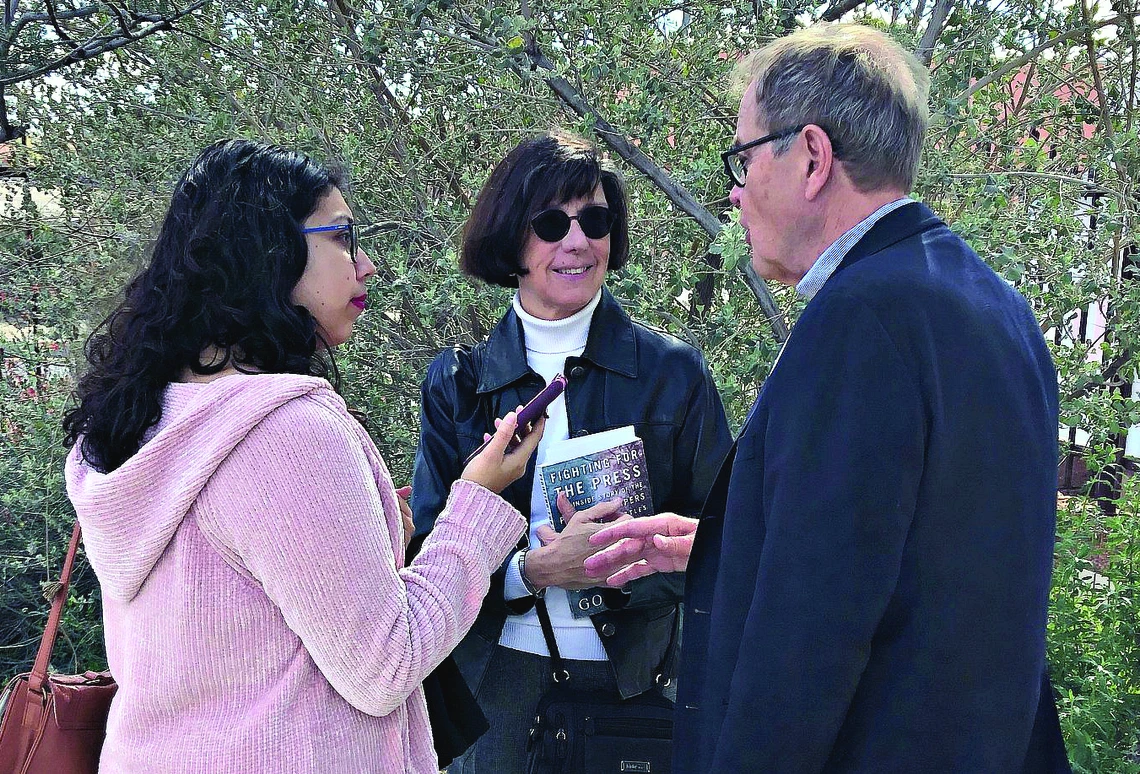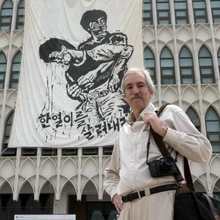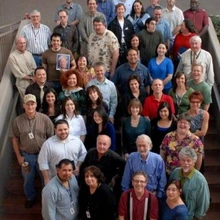Journalism on Screen marks milestone with 20th film

Vanessa Ontiveros of the Arizona Daily Wildcat interviews Profs. Nancy Sharkey and William Schmidt, co-hosts of the school's Journalism on Screen series.
Mike Chesnick / School of Journalism
Journalism on Screen, the University of Arizona School of Journalism's series that uses movies to explore the challenges and perils facing journalists everywhere, marked a milestone on March 17 when it hosted its 20th movie and post-film discussion at Tucson’s Loft Cinema.

“Witnesses to Democracy,” a documentary that examines the pro-democracy movement in South Korea, was followed by a post-film discussion on stage with Journalism Professor Kim Newton, who was a photojournalist based in Asia at the time of the 1987 uprising. Man-jin Kim, the film’s director, and UA East Asian Studies Professors Sunyoung Yang and Nathaniel Smith also answered questions on stage.
Newton is featured prominently in the film, which also follows the mother of slain student protester Lee Han-yeol, whose death propelled the uprising. In June 2017, Newton delivered a framed copy of his iconic image of student protesters holding up a photo of Han-yeol to South Korean President Moon Jae-in.
The Loft series’ fourth season will conclude April 14 with the 2 p.m. screening of “State of Play” as part of a program marking the 10th anniversary of the closing of the Tucson Citizen, the city’s longtime afternoon paper. A panel of former Citizen reporters and editors, including Jennifer Boice (moderator), Corky Simpson, Steve Rivera, Gabrielle Fimbres, Chuck Graham and Dylan Smith, will talk about the film starring Russell Crowe and Rachael McAdams and what it means to a community when it loses one of its daily newspapers.
“Although we’re living in the age of Marvel superhero movies, hard-working journalists are the real superheroes, and should be celebrated as such,” said Jeff Yanc, program director at The Loft Cinema, which co-sponsors the series with the School of Journalism and others. “Without them, we're all in danger, and if that doesn't warrant a superhero franchise, I don’t know what does.”
The series was launched in fall 2015 by Professors Nancy Sharkey and William Schmidt, who were longtime journalists at The New York Times before joining the J-school faculty. The Sunday screenings have averaged close to 200 viewers, with several selling out.
Since the first film — “Absence of Malice” in September 2015 — the series has brought 20 journalists, authors and First Amendment lawyers to the stage. The speakers also visit UA classrooms from the School of Journalism and the School of Law to answer questions from students and lead discussion groups.
“These nationally known journalists inspire our students, motivate them to become watchdogs on democracy and impress them with the impact that good journalism can have,” Sharkey said. “Films like 'Spotlight,' 'Citizenfour' and 'Good Night, and Good Luck' make them proud to be entering the journalistic fraternity.”
Guest speakers have included author Diane McWhorter, who came to Tucson to screen “Selma” and discuss her Pulitzer Prize-winning book “Carry Me Home,” an account of the civil rights era in Birmingham, Alabama; the journalist Glenn Greenwald, whose work breaking the Edward Snowden story was featured in the film “Citizenfour,” and Richard Gilman, publisher of the Boston Globe when the paper broke its stories on child abuse inside the Catholic church, the heart of the movie “Spotlight.” Kurt Luedtke, an Academy-Award winning screenwriter, appeared via Skype at discuss his screenplay for the film “Absence of Malice.”
In addition, 10 current and former reporters, editors and critics from The New York Times have appeared at The Loft and talk to students. The group includes former foreign editor Craig Whitney, obit writer Bruce Weber, Phoenix Bureau chief Fernanda Santos, critics Guy Trebay and Alessandra Stanley, sports reporter Joe Drape, reporter and author David Cay Johnston, editor Sam Sifton and David McCraw and George Freeman, First Amendment lawyers for The Times.
Other guests have included Lowell Bergman, the “60 Minutes” producer who was played by the actor Al Pacino in the movie “The Insider,” author Lynne Olson, a 1969 UA journalism graduate whose book “The Murrow Boys” offered insights into the movie, “Good Night, and Good Luck,” and Jorden Jill Spitz, the editor of the Arizona Daily Star, who spoke about the film “Shattered Glass.” Tucson columnists Tim Steller, Jim Nintzel and Greg Hansen also hosted programs.
The program’s other co-sponsors are The New York Times, the Arizona Daily Star, the UA College of Social and Behavioral Sciences, the Arizona Daily Wildcat/UA-TV3 and the Arizona Inn, the local landmark that contributes lodging for series’ guests. The Center for Border & Global Journalism and UA’s East Asian Studies also sponsored “Witnesses to Democracy.”
Over the years, the School of Journalism has worked with other units across campus and the community to co-sponsor films, including the School of Government and Public Policy, the Racetrack Management Program, the School of Law and East Asian Studies. McWhorter’s presentation of “Selma” coincided with Black History month and was co-sponsored by local Tucson civil rights organizations.

Sharkey and Schmidt have been joined by several colleagues in helping moderate the programs, including Professors Susan Knight and David Cuillier, the school's former director; adjunct instructors Brett Fera and Joe Sharkey; and Will Conroy, who not only helps runs the Arizona Inn – a program sponsor – but also is a screenwriter whose work has appeared in feature and documentary films.
Mike Chesnick, outreach coordinator for the School of Journalism, records the post-film discussions, and most are available on the school’s website or Facebook page at www.journalism.arizona.edu/Loft.
Schmidt said the program is especially important now. At a time when some view the press as villains and enemies of the people, movies about journalism “provide critical common ground and context, reminding us by example and by story that journalists and journalism have an essential role to play in holding the government accountable and safeguarding our democratic norms,” Schmidt said.
“How else can we separate truth from rumor in a more perilous world?” he asked.
• Watch the Q&A and the intro from the March 14 event, “Witnesses to Democracy: The Journey of a Mother and a Photographer.”
• Watch Q&As of past 20 films at journalism.arizona.edu/Loft

